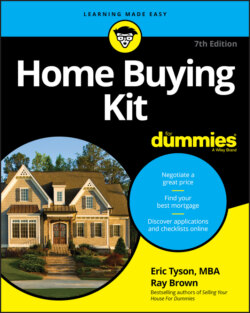Читать книгу Home Buying Kit For Dummies - Eric Tyson - Страница 41
Protecting Yourself, Your Dependents, and Your Assets
ОглавлениеNot carrying proper insurance is potentially disastrous — both to yourself and your dependents. We’re not talking about homeowners insurance here. (Heck, we haven’t even explained how to find a home or get a loan yet! We get to homeowners insurance in Chapter 13.)
You need proper insurance protection for yourself personally, as well as for your assets. Sure, you can take your chances and hope that you never contract a dreaded disease, get into a horrible auto accident, or suffer some other misfortune or bad luck. But misfortune and bad luck usually come knocking without a warning.
Trust us when we say that we’re optimistic, positive thinkers. However — and this is a big however — we know more than a few folks who got themselves (or their families or both) into major financial trouble after purchasing a home because they neglected to obtain proper insurance.
Here are a few cautionary tales:
Steve bought a home and then found out from his doctor that he had multiple sclerosis. Steve ultimately had to cut back on work, and because he lacked proper long-term-disability insurance and now earned much lower work income, he was forced to sell his home at a large loss due to a soft real estate market in his area.
Mary owned a home in California and, despite the known risk of earthquakes, didn’t purchase earthquake coverage. “It’s so expensive, and besides, the insurance companies won’t be able to meet the claims in a major quake. Government assistance will help,” she said. Mary’s home was a total loss in an earthquake, and although the government made a loan, it didn’t pay for the loss — ultimately, the money came out of Mary’s pocket.
Maggie and Donald were living a charmed life in the New England countryside with their two children, a white farmhouse, and a dog and a cat — until Maggie came down with cancer. She left her job, which placed some strain on the family finances. After much treatment, Maggie died. Donald and the kids were forced to move because Maggie lacked proper life insurance.
Michelle had a walkway in disrepair. Unfortunately, one day an older man tripped and severely injured himself. To make a long story short, after lengthy legal proceedings, the settlement in favor of the man was significant enough to force Michelle to sell her home. A good chunk of the settlement money came out of Michelle’s pocket because she lacked sufficient liability insurance.
Now, we’re not about to try to tell you that insurance would have made these situations come out totally fine or that these are common occurrences. Insurance generally can’t prevent most major medical problems, keep a person from dying, or stop someone from suing you. However, proper insurance can protect you and your family from the adverse and severe financial consequences of major problems. The right kind of insurance can make the difference between keeping versus losing your home, and it can help you and your family maintain your standard of living.
Wanting to skip insurance is tempting. After all, insurance costs you your hard-earned, after-tax dollars, and unlike a meal out, a vacation, or a new stereo, insurance has no up-front, tangible benefit.
You hope you won’t need to use insurance, but if you do need it, you’re glad it’s there to protect you and, in some cases, to protect your dependents. Buy too little insurance and it won’t protect you and yours against a real catastrophe. So you need the right amount of coverage that balances good protection against cost.
